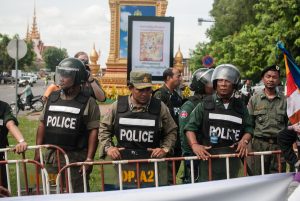Cambodian authorities are accelerating their campaign of repression against opposition activists, as the economic impacts of COVID-19 and European sanctions begin to hit home.
On September 20, police swooped on Oeur Narith, a party youth activist for the now-disbanded opposition Cambodia National Rescue Party (CNRP). He has since been charged with raising funds from abroad in an effort to topple the government of Prime Minister Hun Sen. An aide to former CNRP deputy leader Mu Sochua, Narith was previously arrested in 2014, following clashes between former opposition supporters and security guards employed by the city authorities. He was released after receiving a royal pardon in 2018.
The activist’s brief detention (he was released on bail on Tuesday afternoon) is just the latest episode in an intensifying phase of repression on the part of Hun Sen’s government, building in turn on several years in which most meaningful opposition has been squeezed out of existence.
In recent weeks, Cambodian authorities have broken small protests of youth activists and the relatives of imprisoned rights defenders. It has targeted members of environmental groups that it claims are in breach of a draconian Law on Associations and Non-Government Organizations. It even detained one environmental campaigner as she was leaving the U.N. Human Rights Office in Phnom Penh, where she had sought refuge.
According to the U.N., 24 people have been detained since the arrest of a popular trade union leader on July 31. Rong Chhun, a long-time critic of Hun Sen and his Cambodian People’s Party (CPP) who heads the Cambodian Confederation of Unions, was arrested for comments he made pertaining to Cambodia’s eastern border with Vietnam, a perennial subject of Cambodian nationalist angst. The issue is particularly sensitive for Hun Sen’s government, which was placed in power by an invading Vietnamese army in 1979 and has often been accused of dancing to Hanoi’s tune.
Chhun’s arrest sparked small-scale street protests outside the courts where he is being tried, resulting in additional arrests. The U.N. claims that around half of the imprisoned activists have since been released, while a dozen remain in detention. Many face charges of “incitement,” a legal catch-all that the CPP government has frequently used against recalcitrant critics.
The arrestees also include the 22-year old rapper Kea Sokun, who was arrested on September 4 and charged with incitement. Sokun is understood to have been targeted on the basis of a song he released in April called “Dey Khmer” (“Khmer Land”) in which he commented on long-running fears about the loss of land to Vietnam. Similar nationalist sensitivities also prompted the arrests of a TikTok user who was arrested over a video in which he claimed that Angkor Wat doesn’t belong to Cambodia, and a 17-year-old rapper whose lyrics were critical of Cambodia’s yawning income inequalities.
The ongoing crackdown encapsulates the CPP government’s paranoia about the simmering domestic opposition that is rising amid the COVID-19-induced downturn. Millions of Cambodians are struggling to scrape a living as COVID-19 has cannoned into the main pillars of the Cambodian economy: garment manufacturing, tourism and construction. Many people are also heavily indebted to microfinance institutions, forcing them to take on additional loans to settle existing debts. This has raised the specter of growing landlessness and the further immiseration of the country’s poorest citizens.
Perhaps with one eye on events in neighboring Thailand, where a youth-led protest movement is coalescing into a broader movement demanding reform to key institutions like the Thai monarchy, one government spokesman said recently that authorities would “smash” small protests to avoid them developing into bigger demonstrations. “A small fire can destroy a house,” the spokesman said.
At the same time, shutdowns in Cambodia’s large garment manufacturing sector have been exacerbated by the European Union’s recent suspension of trade preferences on about a fifth of Cambodia exports to the bloc, imposed in response to the deteriorating human rights situation.
Since the national election of 2013, when the CNRP scored significant gains, the CPP has moved assiduously to preempt the emergence of a similar challenge. In 2017, it disbanded the CNRP, after driving its former president Sam Rainsy into exile abroad. It has also made clear that civil society groups should not involve themselves in politics or challenge entrenched interests. The result has been to rob the public of any formal channel for their grievances. Yet popular discontent is not infinitely compressible. As the economic outlook worsens, the pressure will continue to build.

































